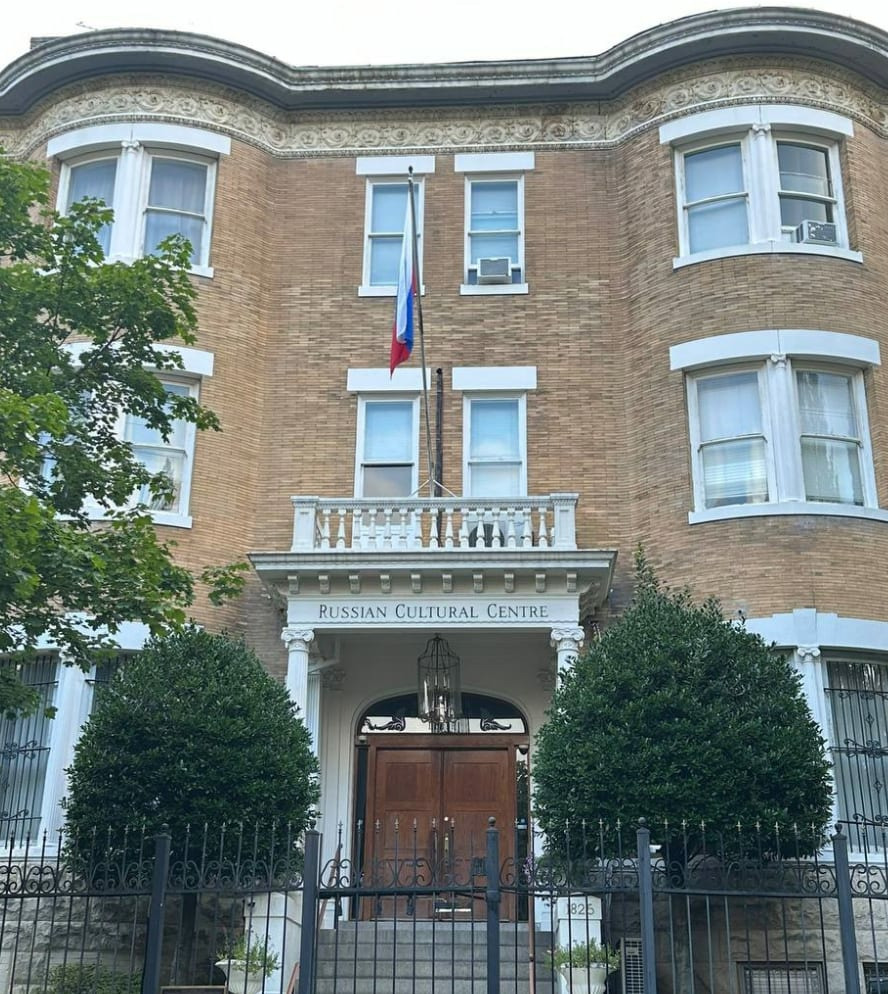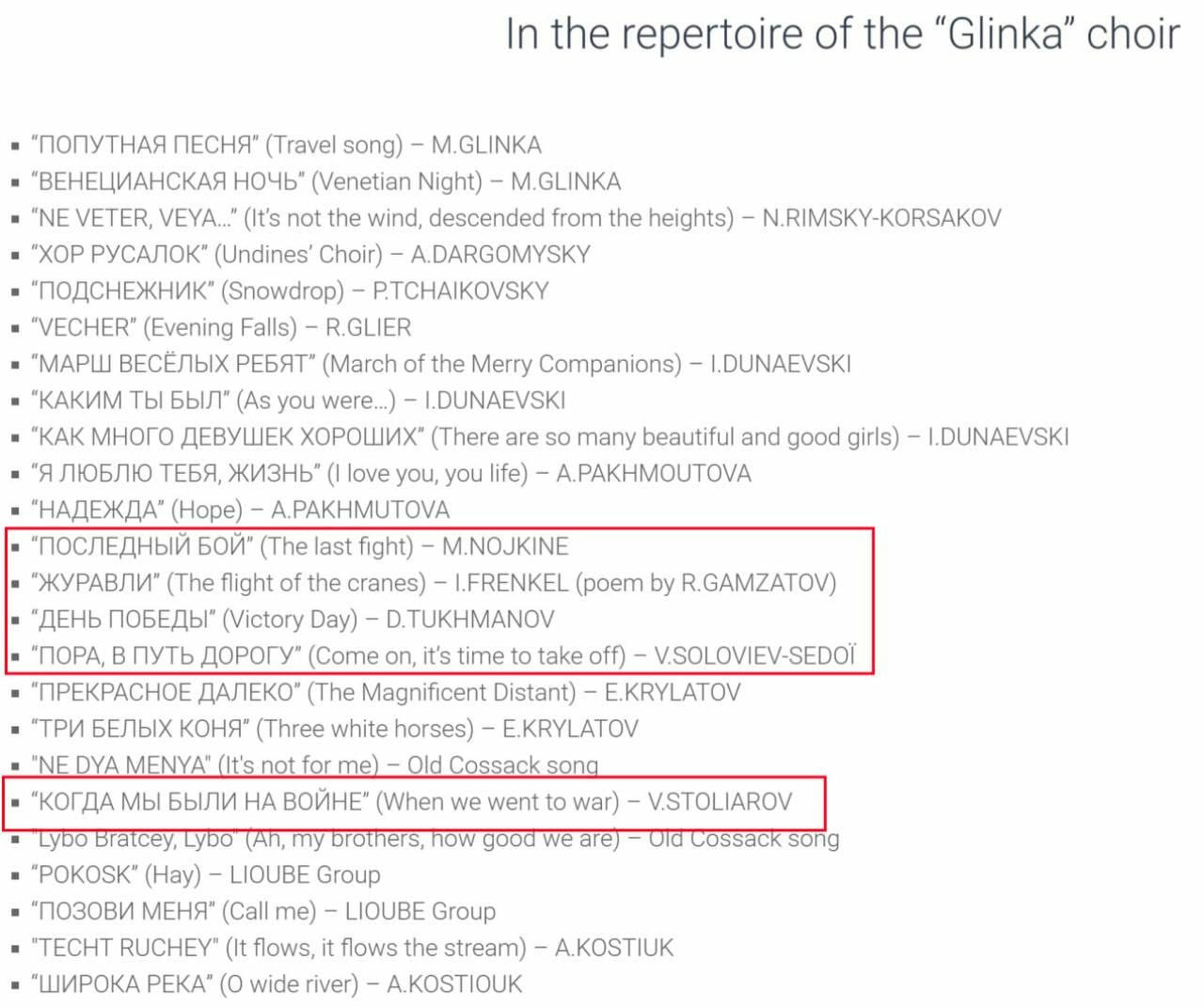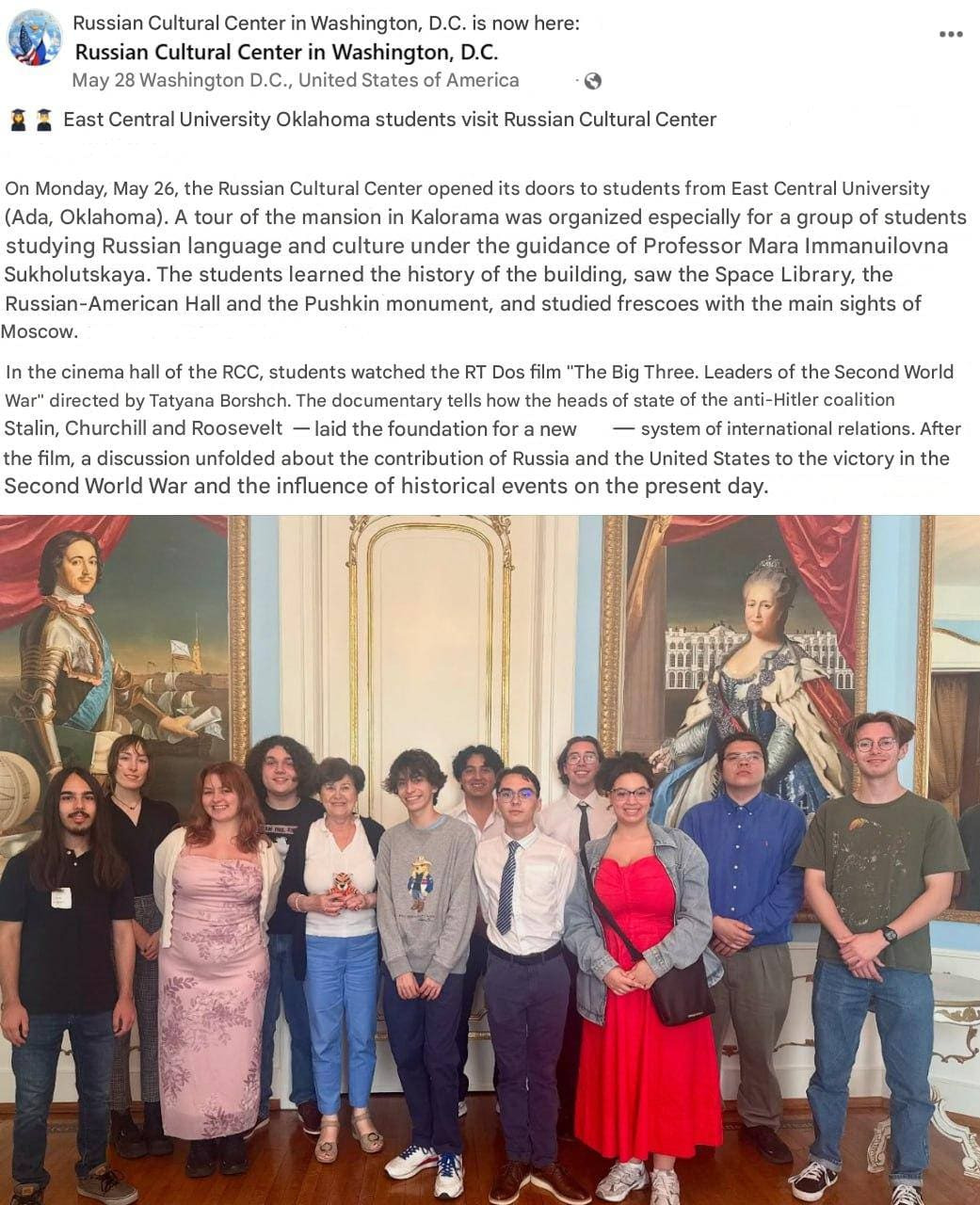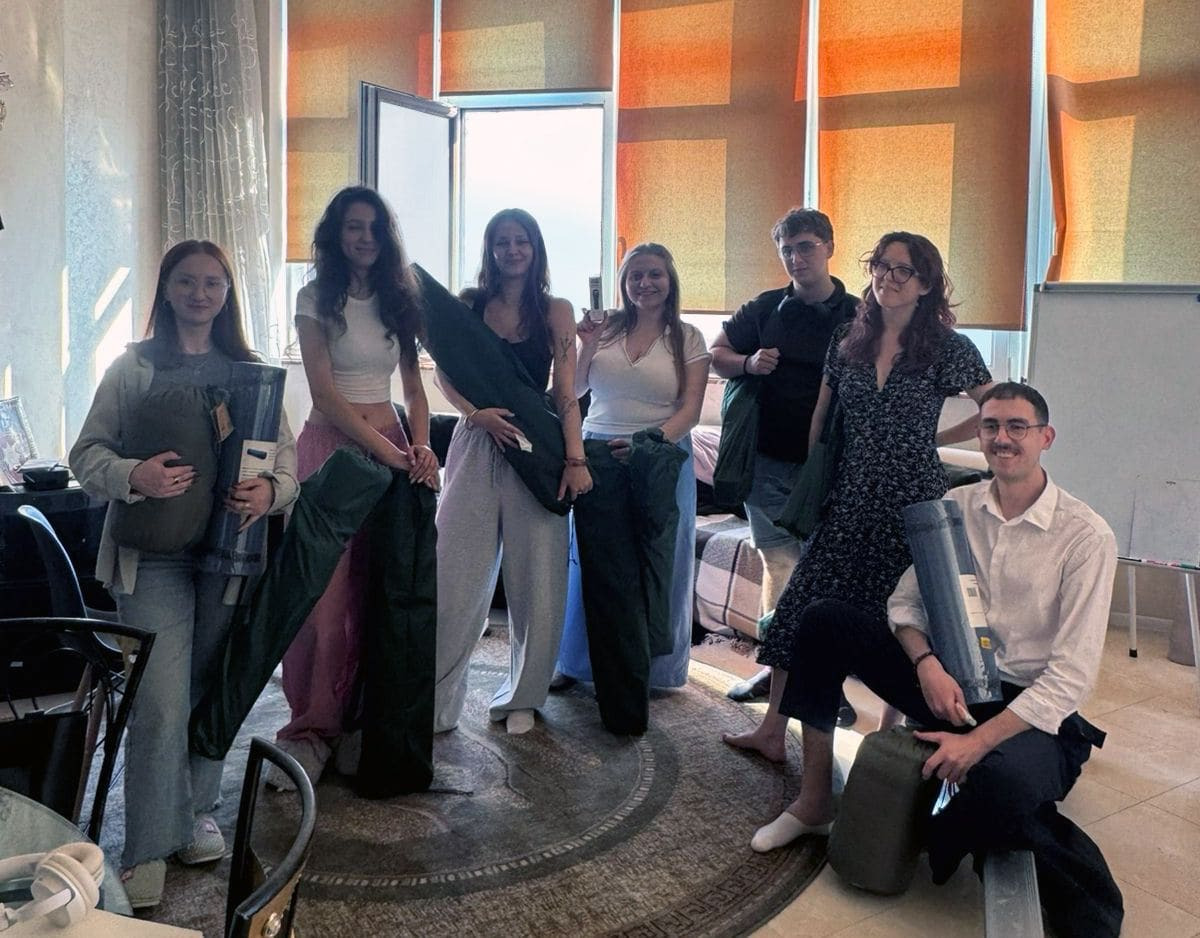Editor’s note:
Russians are not only trying to demoralize Ukrainians through constant shelling, but also to influence foreigners by spreading their narratives.
Upgrade your subscription now to fight back.
Around the same time several Ukrainian families were learning their loved ones had been killed in a massive Russian aerial attack in late May, nearly a dozen American college students were gathered to watch a Kremlin propaganda film.
They weren't studying in Russia—they were actually in the U.S. capital of Washington, D.C.
Students from East Central University in Oklahoma were pictured smiling as they visited the American Russian Cultural Center, where they were shown the film ‘The Big Three – Leaders of the Second World War' by Kremlin-controlled state broadcaster Russia Today.
But not only is this Russian propaganda operation able to operate on U.S. soil freely – it even gets to do it tax free.
A State Department spokesperson told The Counteroffensive that the Russian Cultural Center in the American capital is an “annex of the Embassy of the Russian Federation,” which entitled it not only to stay open but to be exempted from real estate taxes.
Events like these are alarmingly common: While Vladimir Putin's army routinely kills Ukrainian civilians, Russia abuses its diplomatic status to operate its propaganda machine in democratic societies – and the United States is not the only example.
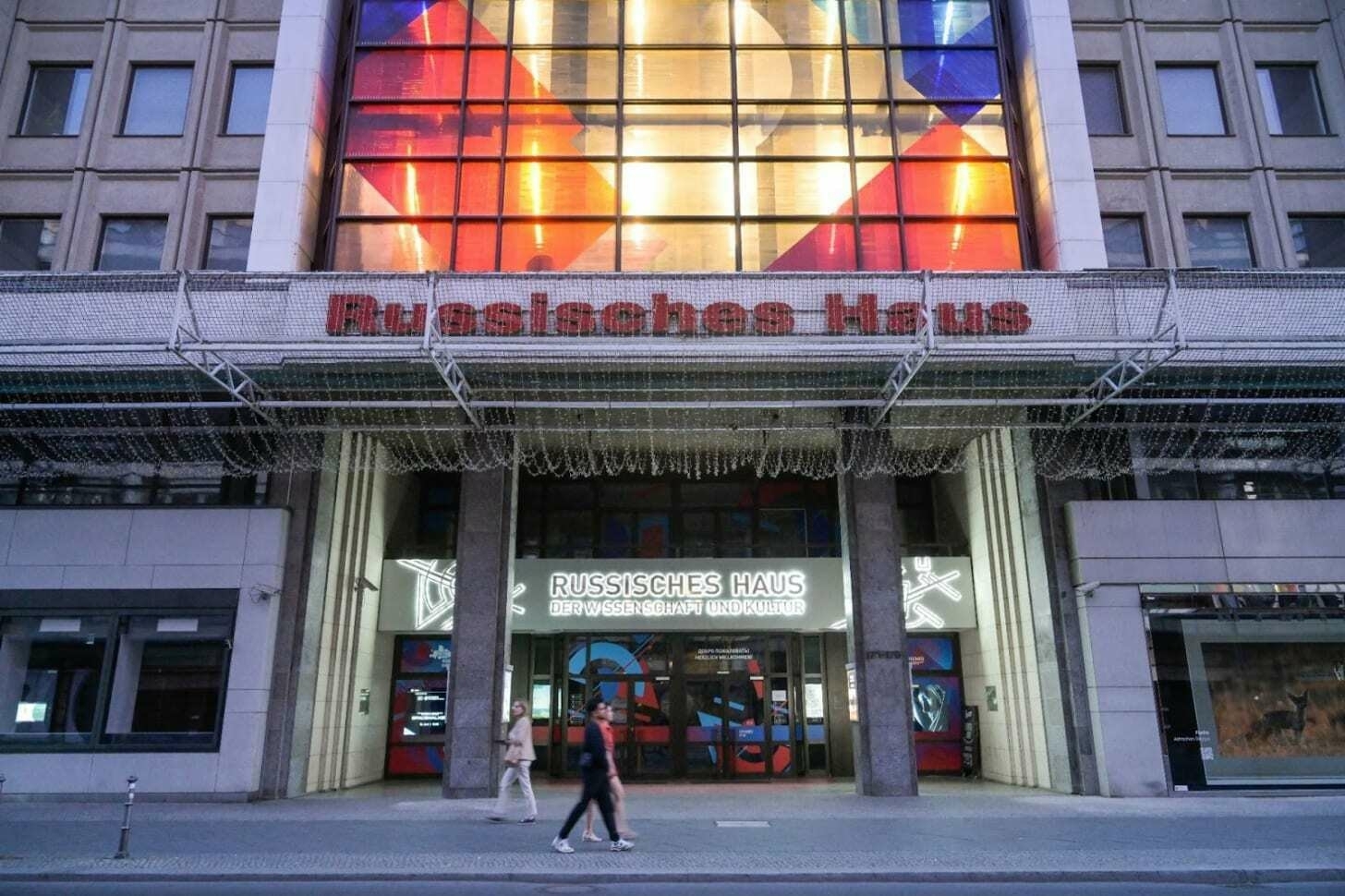
The Russian House in Berlin has repeatedly tried to discredit Ukraine. In October 2022, this Russian House showed the film 'Holocaust: Threads of Memory,' which portrayed Ukrainians as Nazis and was produced by the Russian state broadcaster Russia Today (RT) – which is otherwise blocked in Germany.
Such events are attended by children and teenagers, according to the Russian House in Berlin’s social media posts.
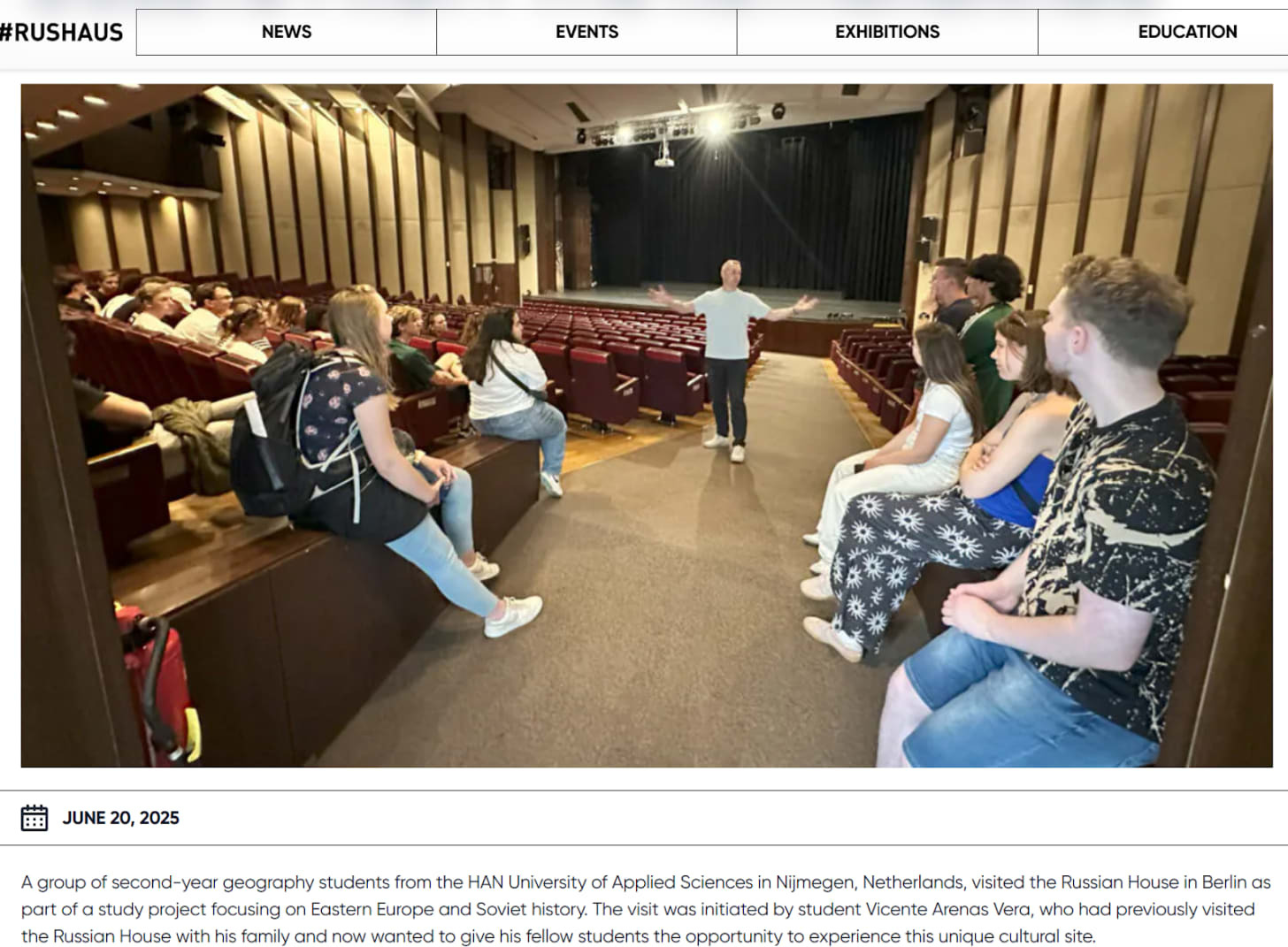
Rossotrudnichestvo, the Russian government agency which runs Russia Houses around the world, is under EU sanctions. But Germany is in no hurry to close this center down, as it would violate a joint agreement.
According to that deal, the Goethe-Institut, the German center of culture, operates in Moscow, and the Russian House in Berlin. In addition, the German federal government continues to pay property tax for the Russian cultural center: a total of about 70,000 euros.
"The agreement is binding on both contracting parties... There is no provision which would allow either party to unilaterally terminate the agreement," the German Foreign Ministry told The Counteroffensive.
The activities of the Russian House in Berlin have caused outrage among Ukrainian activists, who have held protests calling for the center’s closure.
Iryna Shulikina, a Ukrainian woman who has lived in Germany for over 10 years, has been running Vitsche, a Berlin-based NGO that amplifies Ukrainian voices, since 2022.
On June 25, she organized a demonstration against the Russian House in Berlin.
"While missiles rain down on Ukrainian cities, and torture and deportations persist, Germany is effectively subsidizing an instrument of Russian imperial policy," Shulikina told The Counteroffensive. “This is not a cultural center, but a propaganda platform that openly violates EU sanctions.”
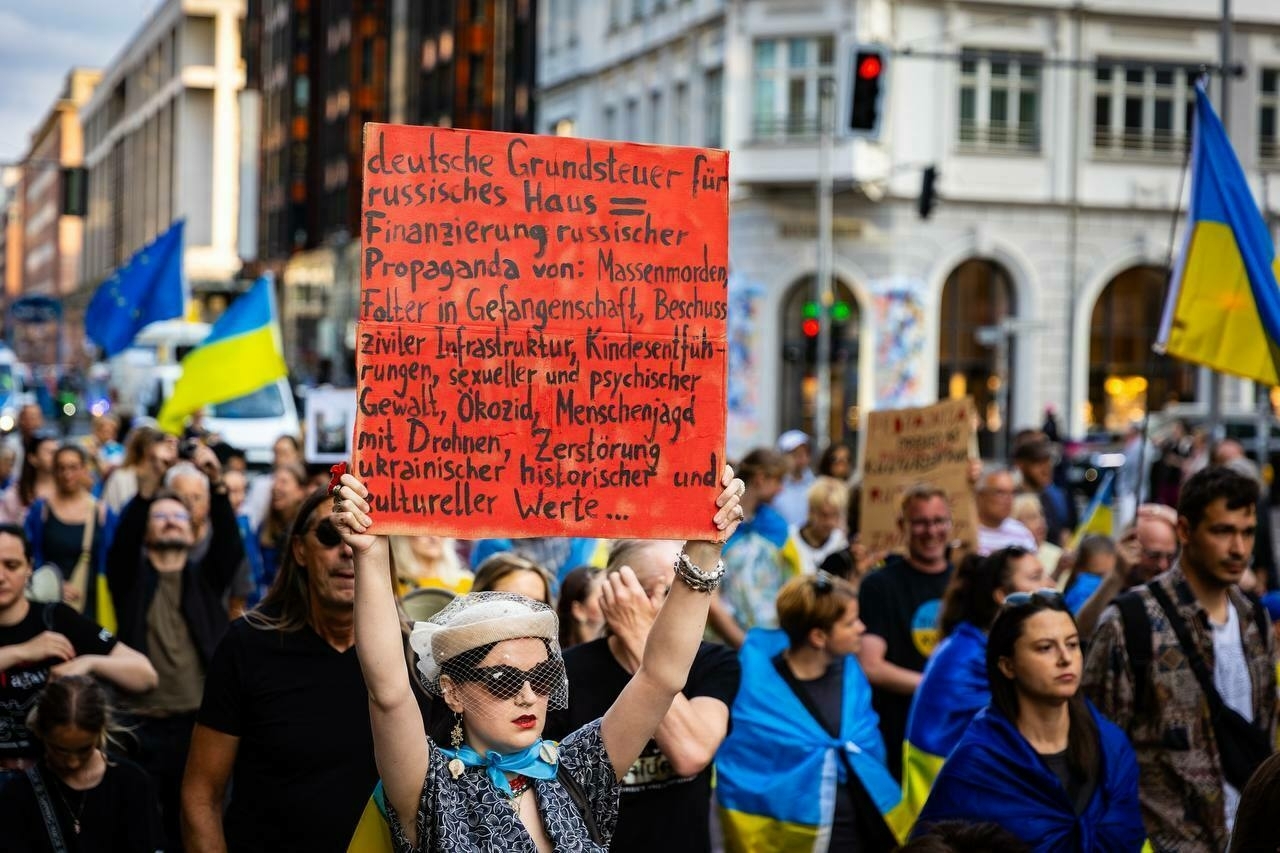
In 2023, German Green Party politician Volker Beck filed a complaint against the Russian House for spreading Russian propaganda.
But investigations initially launched against the diplomats of the Russian House were suspended due to Russia’s diplomatic status, the Berlin Prosecutor General's Office told The Counteroffensive.
At the same time, the prosecutor's office said it is investigating other possible violations of the Russian House in Berlin.
"The Public Prosecutor’s Office continues to investigate unknown individuals as well as the tenants of the Russian House. The alleged offenses concern violations of the Foreign Trade and Payments Act," the Berlin Prosecutor General's Office said.
The scale of global Russia Houses:
These Russian centers currently operate in about 71 countries, according to Rossotrudnichestvo, the organization that runs them, including Washington, D.C, New Delhi, Beijing, Tokyo.
According to Rossotrudnichestvo, Russian Houses in North Macedonia, Croatia, and Montenegro have completely ceased operations, while in Romania and Slovenia, they have suspended operations indefinitely. The Russian House in Azerbaijan has also ceased its work, and the center in Moldova is preparing for closure.
Despite being sanctioned by the EU in 2022, Rossotrudnichestvo continues to operate many of its centers, hosting various events to push Kremlin narratives among young Western students.
The Russian House in Paris, for example, sent four of its French visitors aged 15-17 to a state camp in Russia in the wake of the full-scale invasion.
The hidden goal behind such programs is to cultivate a sense of positivity towards Russia. After returning home from these exchange programs, young students are likely to echo pro-Russian narratives, including justifications for the war against Ukraine.
In this way, Russian Houses work quietly to lend legitimacy to Russia's invasion, even as more and more Ukrainian civilians are indiscriminately killed every day.
The Counteroffensive took a deep dive into Russian Houses’ propaganda activities and identified their directors, revealing that they are trained personnel acting as part of the Kremlin's general apparatus.
The Rossotrudnichestvo is a federal executive agency subordinate to the Russian Ministry of Foreign Affairs. The head of Rossotrudnichestvo is Yevgeny Primakov Jr., the grandson of Russia’s Kyiv-born former Foreign Minister Yevgeny Primakov.
Primakov Sr. served as Director of Foreign Intelligence for half a decade in the 1990s. Like his grandfather, Primakov Jr. has shown strong loyalty to the Russian leader, acting as a campaign surrogate for Putin in 2018.
The purpose of the Russian Houses, according to Rossotrudnichestvo, is to "strengthen Russia's humanitarian influence in the world." In reality, these centers are a display of soft power, a strategy of influence through cultural, ideological and informational appeal rather than direct coercion.
Primakov said as much late last year:
"It is our honor to deliver information [abroad] about the special military operation [what Russia calls the invasion of Ukraine in 2022], its goals, objectives, what we want to achieve in Ukraine."
Despite the sanctions, Russian Houses in the EU have managed to stay open because in some countries, the center is part of a diplomatic mission, and in others, the center is operating under a joint agreement. The activities of the Goethe-Institut in Moscow and the Russian House in Berlin are classic examples of such agreement.
The Kremlin sinks its teeth into youth under the guise of cultural exchange
Russian Houses specifically target youth, though they also aim to reach other age groups.
The Russian House in Paris offers children courses in the Russian language, fine arts, gymnastics, and singing, which at first glance seems innocuous. But the list of songs rehearsed by the students’ choir includes, for example, ‘The Last Fight:’
This song glorifies the act of dying in war for Russia and was written by Russian poet Mikhail Nozhkin, who supported Putin's invasion and called the Ukrainian military "fascists":
One last time, tomorrow, we'll face hand-to-hand combat.
One last time, we'll get to serve Russia.
And it's not scary at all to die for her,
Though deep down, everyone still hopes to live through it!
"Such events, in particular, legitimize Russian aggression against Ukraine and hostility towards Western countries, emphasizing Russia's exceptionalism, which allows it to violate international norms," said Dmytro Zolotukhin, founder of the Institute of Post-Information Society, a Ukrainian NGO, engaged in sanctions policy against Russia.
A striking example of Russia’s soft power program is the ‘People of Artek’ program organized by the Russian House of Science and Culture in Paris.
This free, three-week trip to the Artek children’s camp in occupied Crimea was offered in 2024 to children aged 12-17.
Although references to this program have been removed from the pages of the Russian House in Paris, The Counteroffensive found archived versions of the announcement. Among the selected participants were 18 children from Australia, Germany, Turkey, and France.
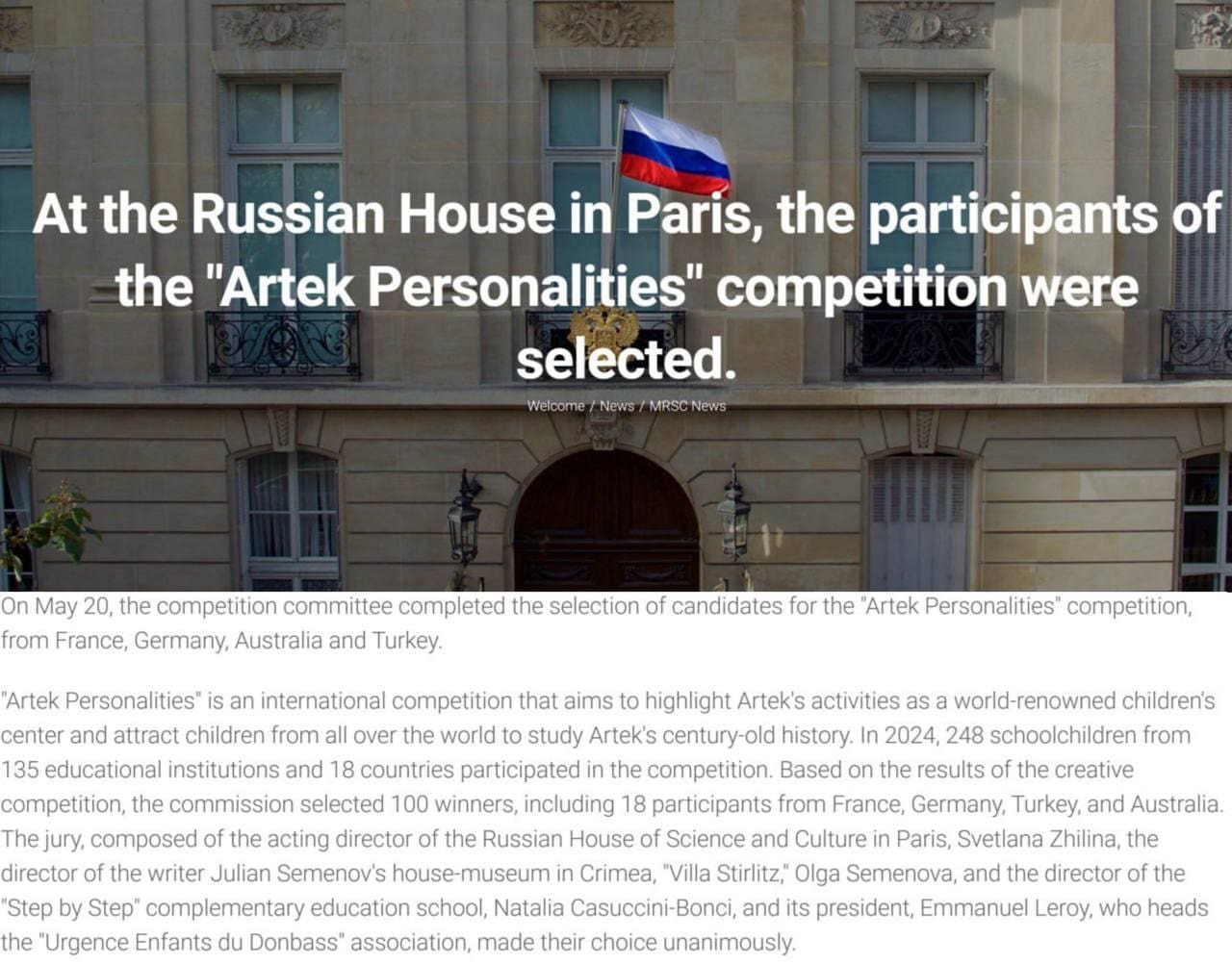
The itinerary of this trip included a thematic ‘Day of Russia,’ a concert by Denis Maidanov, First Deputy Chairman of the State Duma Committee on Culture. Teenagers also participated in the ‘Multinational Palette of Russia’ event, which promoted the ideas of ‘friendship between peoples.’
While ostensibly offering kids a fun vacation, the program effectively links them to Russia and spreads narratives favorable to the Kremlin.
"We are especially grateful that at Artek we were able to be part of a policy of peace and mutual understanding… Schools in Germany will hear about this," said one of the girls after visiting Artek in the summer of 2024, ten years after the invasion of Ukraine began.
"We are united by the Russian language, love for Russia, maybe even the Russian soul," said another visitor from France about his expectations for the camp.
These responses suggest that Russian propaganda is having the desired effect. The peninsula they visited was forcefully seized from Ukraine by Russian troops.
The students from East Central University in Oklahoma who visited the Russian Cultural Center in Washington, D.C. this past spring were shown a film which makes a series of dubious claims about Soviet dictator Josef Stalin and Western leaders of the time.
Young people are also susceptible to influence through social media, where the same Russian Cultural Center in the United States publishes Russia Today videos justifying the occupation of Crimea and praising the 'defenders of the Donbas,' the Kremlin’s preferred term for Russian soldiers who kill Ukrainians.
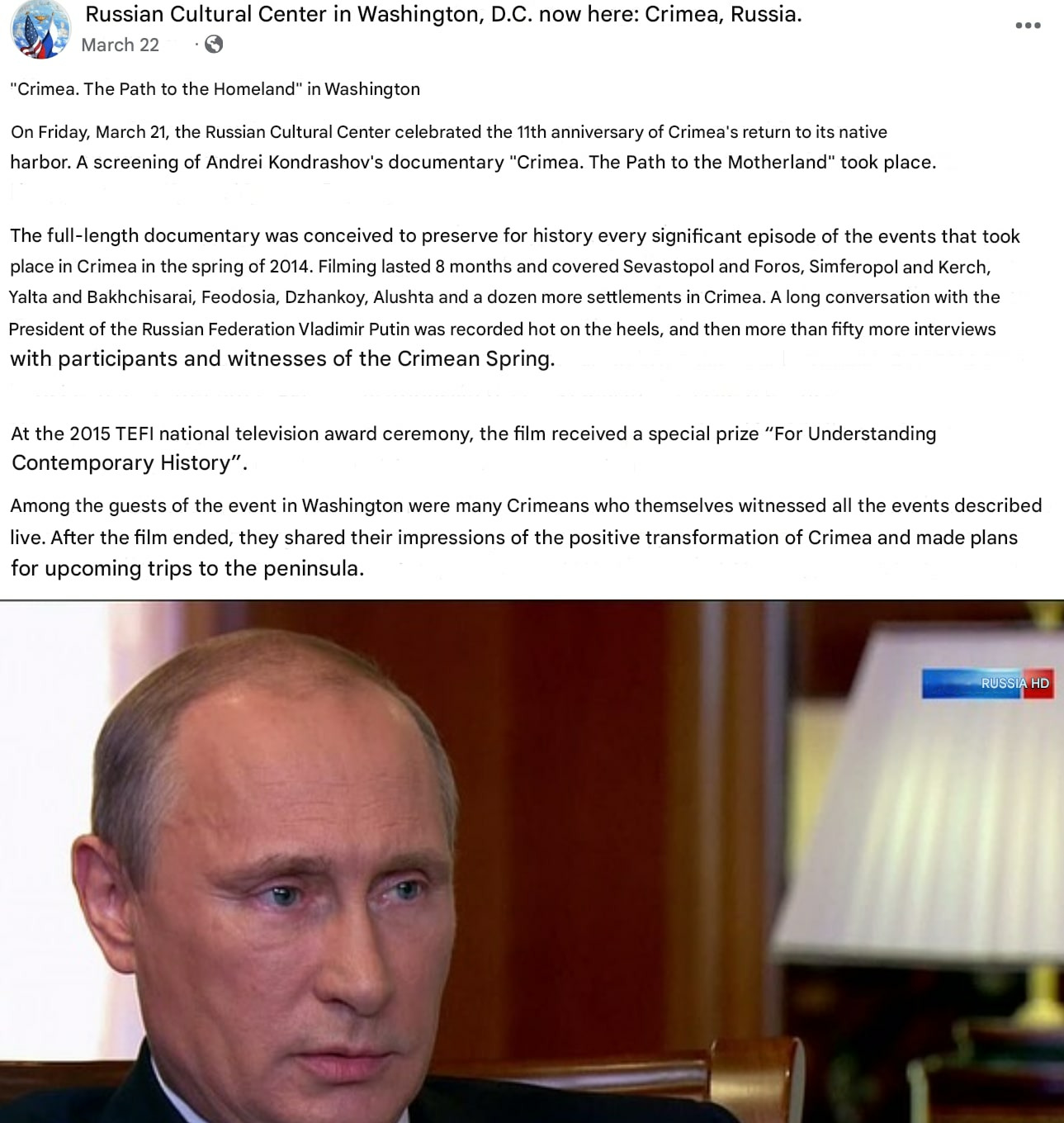
"Such information processing can help destabilize the political situation inside the host countries where Russian Houses operate," Zolotukhin told The Counteroffensive.
Thus, under the guise of 'culture,' the Kremlin is able to use soft power to advance its strategic interests and influence members of the younger generation – and at the expense of you, the taxpayer.
Editor’s note: Your subscription does more than just get you access to our publication – it also helps our team get the gear it needs.
This week we purchased collapsible beds, sleeping bags, ear plugs and eye masks for every member of our team so that they can sleep more securely at night in the bomb shelter. Upgrade to join The Counteroffensive now. Every bit helps!
NEWS OF THE DAY:
By: Sofia Konoplytska
Good morning to readers; Kyiv remains in Ukrainian hands.
GERMANY UNAWARE OF PATRIOT SHIPMENTS: Germany’s Defense Ministry denied that the shipment of Patriot systems to Ukraine has already begun, despite earlier claims by Trump. However, the delivery is expected to be addressed at the upcoming Ukraine Defense Contact Group meeting next week.
According to NATO’s Alexus Grynkewich, they are coordinating closely with Germany and have an order to act “as quickly as possible”.
UKRIANE CABINET RESHUFFLE: Ukraine’s Parliament has officially dismissed Prime Minister Denys Shmyhal and his cabinet as part of an ongoing major government reshuffle. He is the longest-serving PM in the history of Ukraine, and will now take up the role of the new Defense Minister.
Yulia Svyrdylenko, who previously helped negotiate the mineral deal with the U.S., took his position. She formally served as the Minister of Economy and the First Deputy Prime Minister. Approval of other cabinet members by the parliament is anticipated now. This reshuffle is following the shifting dynamics in Ukraine’s relationship with the U.S.
UK, GERMANY TO SIGN A MAJOR SECURITY DEAL: Germany and the UK are expected to sign the most significant bilateral treaty since 1945 today.
The agreement will focus on “security and defense, trade and business”, according to German Chancellor Merz — amid the growing threat from Russia. The deal includes a mutual assistance clause, meaning that an attack on one would be seen as an attack on both – and also aspirational projects like collaboration on AI and a future rail link between the UK and Germany.
This is a part of the UK's Prime Minister Starmer’s effort to restore Britain’s influence in Europe after Brexit.
DOG OF WAR:
During her vacation, Mariana met this adorable dog with a Barbie tail. The owner was struggling to keep it from playing in the mud.
Stay safe out there.
Best,
Liza

